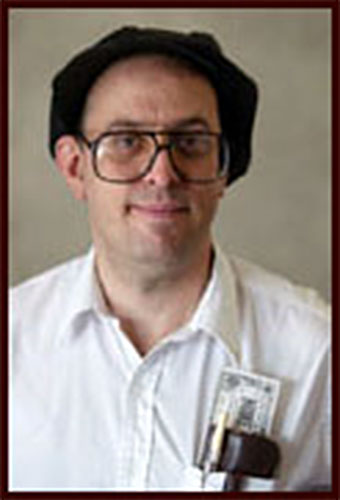
The Retrodictions of Sumadastron the Time-Lost
by Nathaniel S. K. Hellerstein

SUMADASTRON SINGS OF HIMSELF
Poor Sumadastron, lost in time!
One physic law he could outfox;
he hid his prophesies in rhyme
and thus avoided paradox.
He predicted no plots, he scried no ploys;
no battles he foresaw;
but he babbled of baths and baby toys
and universal law.
He raved of an age of wonder;
of magic mechanical tricks
of laboring bolts of thunder
and of thinking arithmetics.
He thus foretold what he knew best
and altered no-one’s fate;
so when at last his jest is guessed
by then ‘twill be too late.
Until that day, no king nor priest
nor a knight, to win a bet
will pay attention in the least
to the Man from Isn’t Yet!
Poor Sumadastron, time-lost fool!
The cosmos will reject
the least exception to the rule
that cause precedes effect!
So fact with fiction he would mix
for those with eyes to see;
born fifteen hundred and sixty-six,
died fifteen zero three.
CANTO THE FIRST
Mechanic’s predetermined goal;
to the cosmic clock be a slave:
but tiny chaos saves the soul
for is light a mote or a wave?
A fiery chariot flying high;
a newborn man‑made moon goes beep;
then eyes and voices in the sky;
a tiny step, a giant leap.
Infinite star beyond star beyond star
should fill the sky with light;
the growth of Heaven, the red of far
explains the dark of night.
A silvery sliver fuels mighty engines;
the tiniest spark of stuff goes smash;
alchemic achievement with a vengeance;
but who will dare take out the trash?
Select the best, that’s Nature’s plan;
survive confusion, want and strife;
from fish to frog, from ape to man;
thus grew the family tree of life.
By sightless light we send our voices;
a dish hears pictures cast from Heaven;
a hundred shows, a hundred choices;
tune in for news, film at eleven.
By G, by T, by C, by A
by double helix in each germ
by count of twisted ladder’s way
the unity of life confirm.
A bovine needle prevents disease;
expires a fire more dire than war;
your body’s on guard, your mind’s at ease
yet the Porcelain Throne saves even more.
Not faith, nor pride, nor fear, nor shame,
nor doctrines work Her wonders out;
by guess, by test, by proof, by claim;
the philosophic Way of Doubt.
My number’s called, I hear it ring;
I flip it open, put it through;
from distant shore I hear you sing;
so good to have a chat with you.

CANTO THE SECOND
Elliptic flies the arc of Mars
while falling free beyond the air.
The Love that moves the sun and stars;
its cosmic reach is inverse square.
The master mechanics of nothing and one
link up to engender the censor’s distress.
A virtueless bubble has virtual fun;
the worldly web in a state of undress.
The time goes slow, the length turns thin;
so heavy near the rate of light;
an age’d meets a youthful twin:
the side-effects of stellar flight.
It sojourned on a dusty creek
by twin peaks under rusty sky;
from distant Earth it came to seek
with millions peeking through its eye.
Unstable Nature’s planless plan
will turn your prophesies to lies;
you do not need a weather man
to know which way the butter flies.
A silver bird with screaming wings;
your captain says, enjoy the ride;
from coast to coast it swiftly flings;
I’ve seen the clouds from either side.
What slew the mighty lizard lords?
A mountain falling from the sky;
and all that lived were vermin hordes,
the ancestors of you and I.
The dark room opens; let’s convene
and loads of dough be sure to bring
to gaze upon the silver screen
where colored shadows dance and sing.
Fair Nature’s fresh and blooming bower
is elder far than it appears.
It took to breed a single flower
a thousand thousand thousand years.
The Porcelain Throne! O hole-y seat!
O honest chair approached in haste!
For public health, relief, retreat;
all other thrones, compared, are waste!
CANTO THE THIRD
Let all creatures compete for their needs
and let Nature select from the strife;
let their fitness survive in their seeds;
then an aeon breeds new forms of life.
In a self-moving counting board, errors may lurk;
tell its music and pictures and games how to run;
then its sand and its logic and lightning shall work
for the master mechanics of nothing and one.
In one direction, deeds conspire;
forever lost is last year’s rose;
the frost will never warm the fire;
for tiny chaos always grows.
I turn the key, release the brake;
two hundred horses roar with power;
but traffic only lets me make
a torpid forty miles an hour.
Inconsistent? Incomplete?
A barrier immovable.
No calculation scheme can beat
“This sentence is unprovable”!
What need for scribe or inky press
for text and pictures, neat or sloppy?
Just push the tab, it does the rest
to make a copy, copy, copy.
Two minds contend within my mind;
my left head’s numbered logic clings,
but on the other hand you’ll find
a dancing mystic poet sings.
I click a switch - it flickers on
I turn the lamp - the bulb’s too bright;
outside my window, dark as dawn
the midnight streets have noonday light.
The relic of an inward blast
so dense and low, not even light
nor any matter, slow or fast
can flee a star as dark as night.
To ride at ease through desert heat;
to dine on berries all the year;
to guard the health of milk and meat;
to keep on ice a can of beer.

CANTO THE FOURTH
O thrifty, lazy universe!
Each mote and man and beast
shall find a path it may traverse
whose action is the least!
A rod of iron on the roof
protects the house from Heaven’s fire
whose lawful nature has this proof;
the thunderbolt in copper wire.
Abase thyself, O pride of Man!
In space and time, in might and main
our weight within the cosmic plan
is lighter than a tiny grain.
A day that fever lays you ill;
a plague of pests too small to see;
a mold compressed into a pill;
‘tis death for them but not for thee.
Though motion plus position
would figure the path exact,
yet partial is precision
because of the mote of act.
With songs to hear and sights to see
a web of wonders, lightning-quick;
the world’s widest library,
just point your mouse and double click.
Assured of thy supremacy?
O foolish human, don’t be smug!
For great and wide’s our family tree,
dear sister seaweed, brother bug!
The thunderbolt in copper wire
drinks sunshine, wind and oil
for light at night, and flameless fire
and constant mighty toil.
How does it get from A to B?
By every pathway, plain or crazed;
find action on each history;
their sum is how its wave is phased.
O King, there is no place to run
or hide, nor can you stand and fight.
Behold the fire of the sun
whose vim is mass times light times light.
CANTO THE FIFTH
Despite my sight, I can’t believe
these leaves of leaves of leaves of leaves.
My casual glance beside the path
is ambushed by poetic math.
Engrave a glyph on a chip of sand,
Add lightning to make the thing run,
So midnight mechanics may command
the logic of nothing and one.
They’re a multitude of specks of goo
and each teeny beast is weak;
But they’re everywhere, and they’re mighty too;
They’re the Lords of Earth, the meek.
This brilliant burning ruby ray
so swift and sharp, can soon
inform me just how much to pay
or the distance to the Moon.
A lettered thread, a double screw;
a message from your parent’s day;
the only stuff that’s truly you;
by G, by T, by C, by A.
A window into distant lands,
an entertainer and reporter;
Alas! controlled by wealthy hands;
a base deceiver and distorter.
These motes, all ninety-four, may be
in all but stellar fire found;
the building-blocks of all you see,
by crazy wavy logic bound.
It’s made to labor on and on;
not born nor bred, but built to plan;
what name for this automaton?
A slave? A pet? Not yet a man?
It’s a spinning spark, it’s an atom’s part,
It’s a lightning-bolt and a riddle;
It smote like a mote at the end and the start
Yet it plays like a wave, in the middle.
O lilting Lady, sing the blues!
This shining disk shall bear
Your voice, so new, so clear, so true
Though you, alas, aren’t there.

General Editor's Note
Professor Hellerstein's remarkable piece arrived with the following cover letter:
Dear Rudy:
You want science fiction for your FLURB Webzine, and I have something that might qualify, but I’m not sure, so I’m running it past you.
Part of the problem is, it’s not by me, but by this late-medieval wiseacre named Sumadastron. According to him, he was born in 1566, and died in 1503(!). According to Wikipedia (although this entry has now been suppressed), he was a jester, magician and juggler. He wrote a bunch of quatrains he called Retrodictions, but the Church put them on the Index Of Forbidden Books, so nobody’s seen them for centuries.
Until now. How did I get hold of his manuscript? Short version: I got lost in Chinatown, I wandered into a skanky olde curiosity shoppe, and I found a copy of Mad magazine with some yellowing pages stuck inside. The elderly proprietor told me, in broken English, that the manuscript had been hidden in the Vatican, given to the Knights Templar, bought by Adam Weisshaupt, appropriated by Napoleon, acquired by the Kaiser, smuggled into Paris, looted by the Nazis, stolen by Stalin, sold to the Moonies, found by Disney, and taken by Scientologists; and it could be mine for just one dollar and thirty-seven cents.
I didn’t believe a word of that, but on a lark I glanced at the manuscript, and my eye lit on Canto One, Quatrain Two. Right away I grokked, “space flight”. Leafing through the manuscript with increasing excitement, I found quatrains about relativity, entropy, electricity, fractals and much else. So I bought the manuscript, along with the Mad magazine, for a nice round $5. (A real bargain, by the way: that Mad was the issue with Superduperman.)
At first I had my doubts. What would a 16 th century charlatan know about TV, nukes and quantum mechanics? But you see, if this is a hoax, then it’s one I like. Sumadastron sounds the way a castaway time traveler ought to sound. No vague and stupid political predictions; who cares which thug beat which? But cell-phones, cars, vaccination... these are new things, interesting and unanticipated, that made a real difference in people’s lives. The sort of stuff that a real time-traveler would miss.
Mind you, he’s clear enough from our point of view, but to someone in the 16 th century, our technology is indistinguishable from magic, and our science is indistinguishable from mysticism. But that’s the life we live!
Frankly, Rudy, Sumadastron has spoiled every other prophet for me. They describe lots of fights, but never any facts. Fooey. Compared to him, they’re all such clueless suck-ups.
Some friends and relatives of mine who’ve seen the Retrodictions want me to carbon-date the manuscript before I publish it. They said I might look foolish if I don’t. But I said this is no time for half-measures. This material has been waiting for centuries; why delay its release a moment longer? Let the People decide if I’m a nut or not!
At first I wanted to send it to Nature Magazine, or the American Physical Review, or the New York Times, or the Nobel Prize committee in Stockholm. But then I realized that anything this big ought to go to the top top rank of the planetary media; and that of course means FLURB. That’s why you get first choice.
But there’s a problem, Rudy; does this qualify as science fiction? Except for the introduction, every single one of Sumadastron’s retrodictions is science; so where’s the fiction? If this doesn’t fit FLURB’s editorial requirements at this time, then please tell me right away, so I can activate plan B: Stockholm.
Sincerely,
Nathaniel
About the Author

Nathaniel Hellerstein was born in Boston, and now lives in San Francisco with his wife Sherri Krynski and their daughter Hannah. He is presently underemployed, as he has been for the past twenty -two years, doing part-time teaching of high-school math (algebra, trig, and statistics) at the City College of San Francisco and the College of San Mateo. This has left him plenty of time to do math research --- including several books on logic, including Diamond : A Paradox Logic --- as well as plenty of time to invent new board games, invent a new system of playing cards, compose poems, and even write the occasional science-fiction story. Most of the latter, lately, were written for and to Hannah.
Please mention the author or this piece's name in your comment.